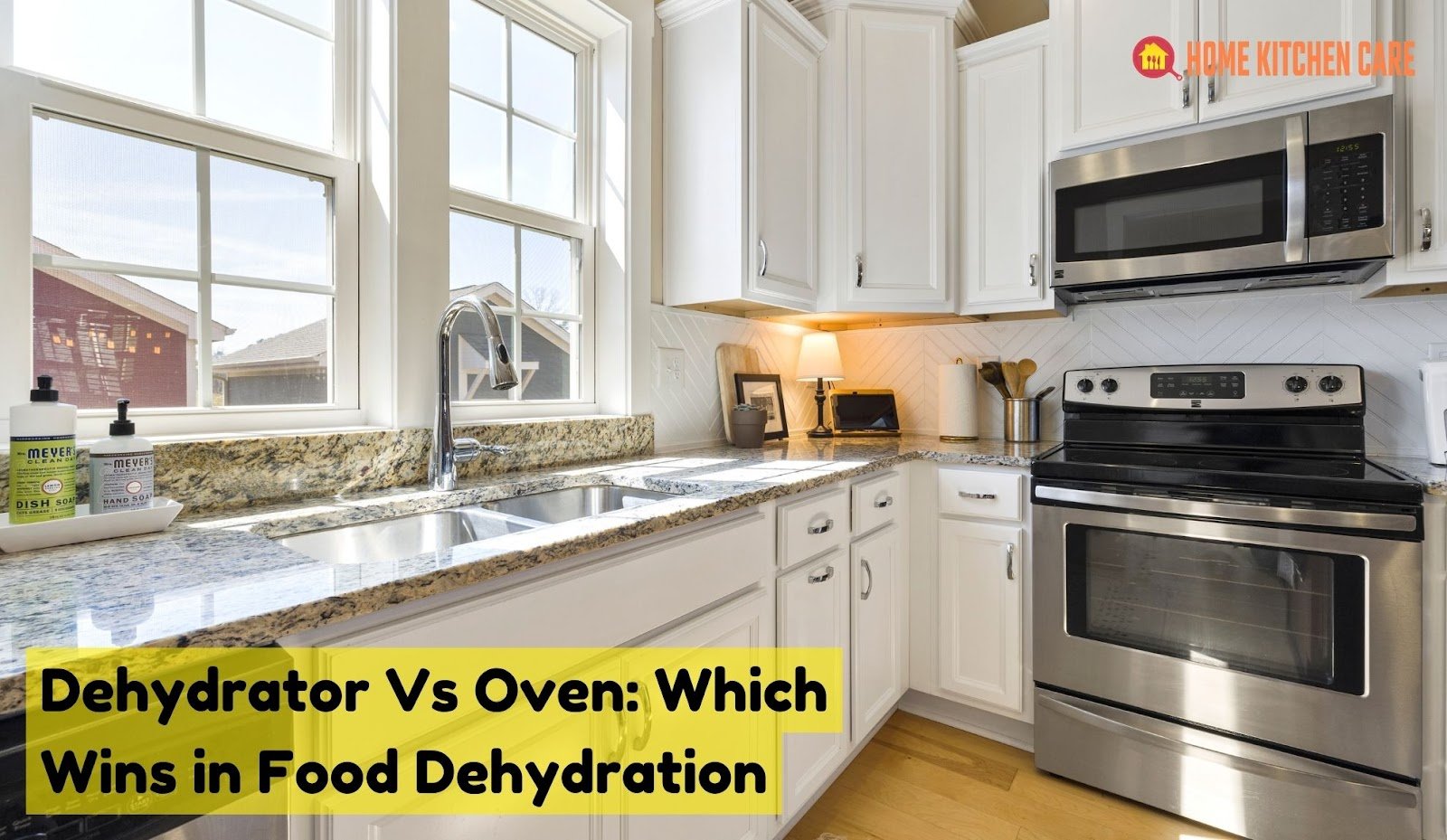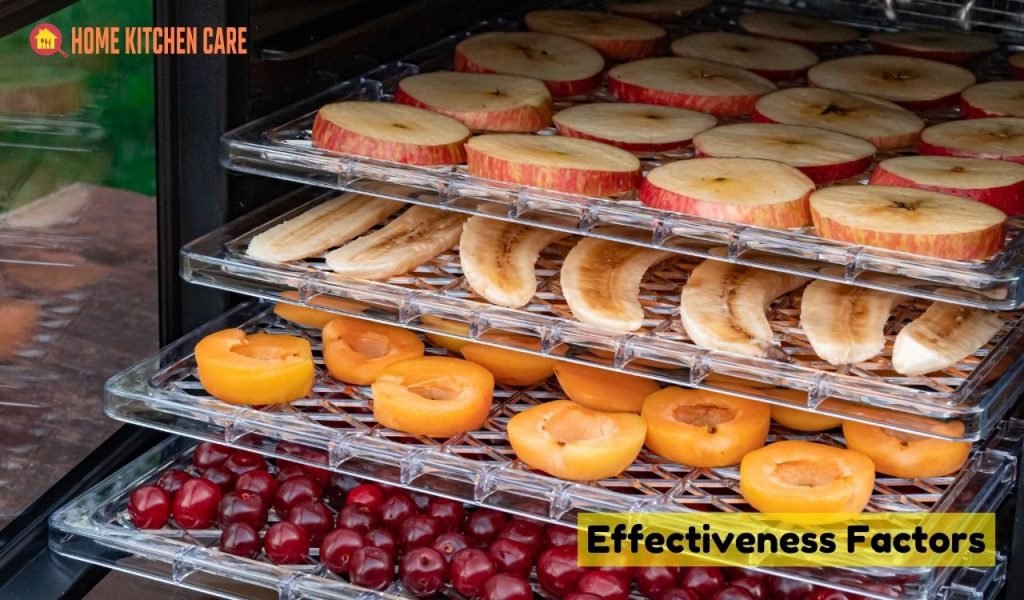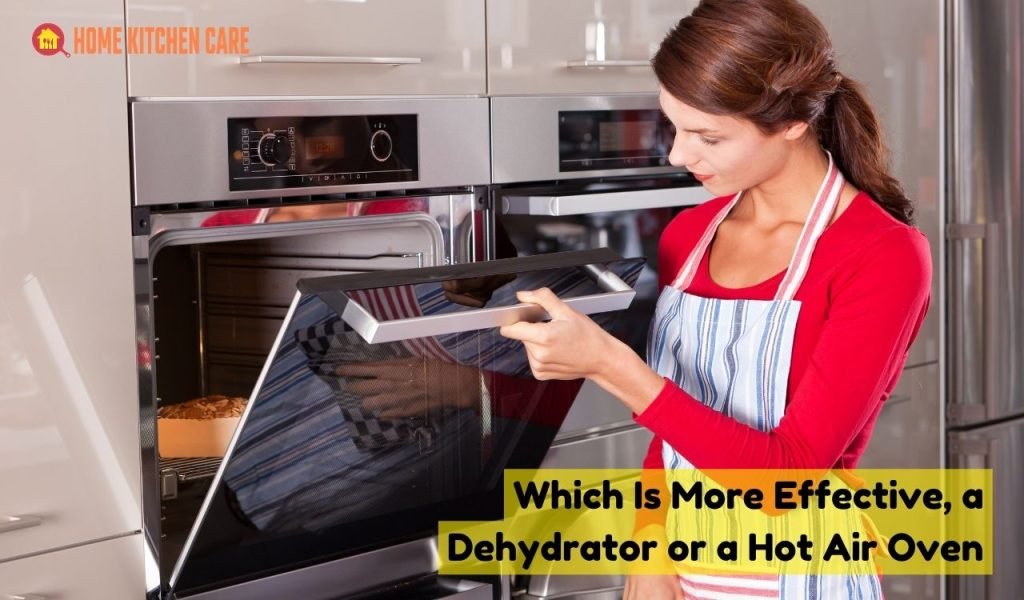Physical Address
304 North Cardinal St.
Dorchester Center, MA 02124
Physical Address
304 North Cardinal St.
Dorchester Center, MA 02124

Dehydrator vs Oven: Which appliance reigns supreme in the battle of food dehydration? If you’ve ever wondered about the best tool for drying fruits, vegetables, or making homemade jerky, this guide has got you covered. Whether you’re a seasoned dehydrator enthusiast or a curious culinary explorer, we’ll dive into the key differences, advantages, and limitations of dehydrators and ovens.
Get ready to uncover the secrets behind optimal drying techniques and discover which appliance is the ultimate champion in preserving flavors, textures, and nutrients. So, grab your apron and let’s embark on a dehydrating adventure that will revolutionize your kitchen and tantalize your taste buds.
Main Summary: Dehydrator vs Oven
Dehydrator vs Oven: A Quick Comparison – Dehydrators gently remove moisture, preserving nutrients and flavors, yielding crispier results. Ovens work, but at higher temps, nutrients may degrade. Choose dehydrators for healthier, tastier snacks; ovens for occasional, less efficient drying.
In the world of kitchen appliances, two contenders stand out when it comes to food preservation and cooking techniques: the dehydrator and the oven. While both serve their purposes in removing moisture from food, they differ significantly in functionality, effectiveness, and versatility.
In this comprehensive guide, we will delve into the depths of dehydrators and ovens, exploring their differences, benefits, and helping you make an informed decision about which one suits your needs.
To grasp the disparities between dehydrators and ovens, it’s essential to understand their core principles and functionalities.
A dehydrator is a specialized appliance designed to gently remove moisture from food items. It operates at low temperatures, utilizing continuous airflow to ensure even drying. With multiple trays for simultaneous drying, dehydrators maintain consistency in heat distribution, preserving the flavors and nutrients of the food. The controlled temperature prevents cooking, resulting in perfectly dehydrated ingredients.
On the other hand, an oven is a versatile kitchen workhorse primarily used for cooking. While not specifically designed for dehydration, ovens can still serve the purpose. Ovens generate heat through heating elements and distribute it through the enclosed chamber via convection, allowing for a range of cooking methods.
However, it’s important to note that ovens often operate at higher temperatures, which may impact the final outcome of the dehydration process.

Now that we understand the basic differences, let’s explore the effectiveness of dehydrators and ovens in various aspects.
When faced with the decision of choosing the right tool for your food dehydration needs, considering factors such as food type, quantity, and desired outcomes is crucial. By weighing these considerations, you can determine whether a dehydrator or an oven is the optimal choice for your specific requirements.
The type of food you wish to dehydrate and the quantity you plan to process are important factors to consider when choosing between a dehydrator and an oven.
When considering the differences between dehydrators and ovens, their cooking versatility plays a significant role. While dehydrators specialize in removing moisture from food, ovens offer a wider range of culinary possibilities beyond dehydration. Understanding the cooking versatility of each appliance can help you determine which one aligns with your cooking preferences and needs.
When it comes to cooking versatility, dehydrators specialize in drying food, while ovens offer a broader range of culinary functions. Consider your cooking needs and preferences to determine which appliance aligns better with your desired cooking capabilities.

When comparing the effectiveness of a dehydrator and a hot air oven, several factors come into play. Both appliances are capable of dehydrating food, but their functionality and outcomes may differ. In this section, we will examine the effectiveness of dehydrators and hot air ovens in terms of their drying performance and overall results.
Dehydrators are specifically designed for gentle drying. They operate at low temperatures and utilize controlled airflow to gradually remove moisture from food. This gentle drying process helps preserve the flavors, nutrients, and textures of the ingredients.
Dehydrators are highly effective in maintaining the nutritional content of the food, making them an ideal choice for those who prioritize the preservation of vitamins, minerals, and enzymes.
Hot air ovens can also be used for dehydration purposes, but they generally operate at higher temperatures compared to dehydrators. While hot air ovens can effectively remove moisture from food, the higher heat levels may impact the drying process.
The faster drying time in ovens can potentially lead to nutrient loss and changes in texture. However, ovens offer the advantage of versatility, allowing you to perform various cooking methods in addition to dehydration.
The effectiveness of choosing between a dehydrator and a hot air oven depends on your specific needs and priorities. If preserving the nutritional value of the food and achieving consistent results are of utmost importance, a dehydrator is generally considered the more effective choice. Its gentle drying process ensures minimal nutrient loss and maintains the quality of the dehydrated food.
However, if you prioritize versatility and the ability to perform multiple cooking methods in addition to dehydration, a hot air oven may be more suitable. Ovens offer the advantage of being a multipurpose appliance, allowing you to bake, roast, and perform other cooking techniques alongside dehydration.
It is important to consider factors such as the food type, desired drying results, and the extent of your dehydration needs when choosing between a dehydrator and a hot air oven. Assessing the unique features, limitations, and your specific requirements will help you determine which appliance is more effective for your intended purpose.
In the debate between dehydrators and hot air ovens, both appliances have their strengths and limitations. Dehydrators are highly effective in gentle drying, preserving nutrients, and maintaining the quality of the food. They are the preferred choice for those seeking maximum nutritional preservation and consistent results in dehydration.
On the other hand, hot air ovens offer versatility and the ability to perform various cooking methods in addition to dehydration. While they may not provide the same level of nutrient preservation as dehydrators, they can still effectively dehydrate food with the added benefit of being a multipurpose appliance.
Ultimately, the choice between a dehydrator and a hot air oven depends on your specific needs, priorities, and the extent of your dehydration and cooking endeavors. By considering factors such as the desired drying outcomes, versatility requirements, and nutritional preservation, you can make an informed decision to select the most effective appliance for your intended purpose.
Yes, an oven can work for dehydrating food, but it may not work as well as a dedicated dehydrator. Ovens generally operate at higher temperatures, which can lead to faster drying and potential nutrient loss. Dehydrators, on the other hand, offer precise temperature control and even airflow, resulting in more consistent and efficient dehydration.
Opinions may vary, but many people prefer dehydrator jerky over oven jerky. Dehydrators provide a controlled, low-temperature drying environment that helps retain the flavors, textures, and moisture content of the meat. Oven jerky may dry faster, but it can be prone to overcooking and become less tender compared to jerky made in a dehydrator.
To dehydrate food in a dehydrator, start by slicing the food into uniform pieces. Arrange the slices on the dehydrator trays, ensuring proper spacing for adequate airflow. Set the desired temperature and drying time according to the food type and the dehydrator’s instructions. Regularly check the progress and rotate the trays if necessary. Once dried to your desired texture, remove the food and let it cool before storage.
In general, a dedicated food dehydrator works better for drying food compared to an oven. Dehydrators offer precise temperature control, consistent airflow, and multiple trays for simultaneous drying. They are designed specifically for gentle, efficient dehydration, preserving flavors and nutrients.
Ovens, while capable of dehydrating, often operate at higher temperatures, which can lead to faster drying and potential nutrient loss. Ovens are more versatile for cooking purposes but may not provide the same level of effectiveness and control as dehydrators for drying food.
Yes, you can use an oven as a makeshift dehydrator. However, it’s important to note that ovens may not offer the same level of control and efficiency as dedicated dehydrators. Ovens operate at higher temperatures and may lack the precise airflow needed for optimal dehydration.
While it can work for occasional or small-scale dehydration, if you plan to dehydrate food regularly and achieve consistent results, investing in a dehydrator is recommended.
A food dehydrator works by circulating warm air at low temperatures around the food. The dehydrator’s heating element warms the air, while a fan distributes the warm air evenly throughout the drying chamber. As the warm air circulates, it gradually removes moisture from the food, resulting in dehydration. The process helps preserve the food’s flavors, nutrients, and textures while extending its shelf life.
The decision to get a dehydrator or use the oven depends on your specific needs, preferences, and frequency of dehydration. If you plan to dehydrate food regularly and desire precise control over the drying process, investing in a dedicated dehydrator is recommended.
Dehydrators offer efficient, consistent results and are designed specifically for dehydration. However, if you have limited kitchen space, occasional dehydration needs, or prefer a more versatile appliance for cooking purposes, using the oven as a makeshift dehydrator can be a practical option.